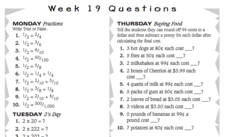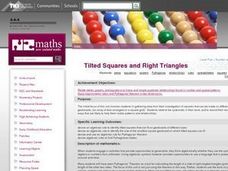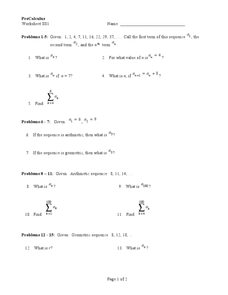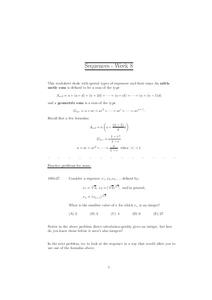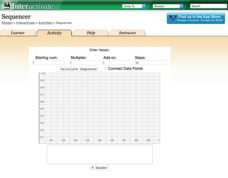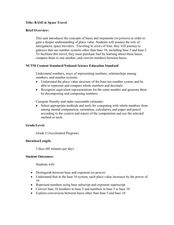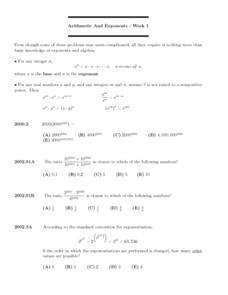Scholastic
Week 19 Questions
Present your young mathematicians with a new challenge each day. Fractions on Monday, Tuesday is 2's Day, Wednesday is for squares, Thursday is 99 cents day, and by Friday it's time to deal with time. In addition, just for fun, there's a...
Public Schools of North Carolina
Math Stars: A Problem-Solving Newsletter Grade 1
Keep the skills of your young mathematicians up-to-date with this series of newsletter worksheets. Offering a wide array of basic arithmetic, geometry, and problem solving exercises, this resource is a great way to develop the critical...
Curated OER
The Function Box
Students look around classroom and identify any patterns they see, describe patterns and explain why they are patterns, use pencil to demonstrate arithmetic patterns by tapping, practice predicting patterns by using Function Box, and...
Curated OER
Sequences
In this sequences learning exercise, 6th graders solve and complete 3 different types of problems. First, they complete the missing numbers and determine the term-to-term rule. Then, students find the nth term of each sequence and draw...
Curated OER
The Three Pigs
Second graders design and construct homes for the three pigs. Each of the homes is made and filled with patterns that we explore. They continue a sequential pattern and describe a rule for this.
Curated OER
Seven Sequences and Series Activities
In this sequences and series worksheet, students complete seven activities covering arithmetic sequences, geometric sequences, and series. Fully worked out examples, formulas, and explanations are included.
Curated OER
Tilted Squares and Right Triangles
Students investigate squares. They generate patterns from structured situations and find a rule for the general term and express it using words and symbols. Students generate patterns from a rule and substitute values and formulas.
Curated OER
Decode Word Is..
Students solve problems using patterns. In this algebra lesson, students identify the relation, domain and range of a function. They graph functions using coordinate pairs.
Curated OER
The Number Table Problem
In this number table problem, students explore tables and determine the number pattern. This one-page learning exercise contains 1 problem. Answers are provided at the bottom of the page.
Curated OER
Fractals Teachers' Notes
When you see a flower or a tree in nature do you see the math? This web resource contains many ideas for using fractals in a math class including Sierpinski’s triangle, Koch's Snowflake, and the Jurassic Park Fractal. Additionally, it...
Curated OER
Discovering Growth Patterns
Young scholars explain the differences between linear (arithmetic) and exponential (geometric) growth. They use worksheets imbedded in this lesson plan to help them make predicitions and graph data points.
Curated OER
Describing Patterns
Fourth graders investigate repeating and growing patterns. Models, graphs and words are used to describe, extend and represent patterns. Students use evidence from models and graphs to support the identification of patterns.
Curated OER
Finding Sums and Terms for Geometric and Algebraic Sequences
In this sequences worksheet, students solve for the sum of ten sequences. Students solve for a specified term of the geometric or arithmetic sequence in fourteen other problems.
Curated OER
Sequences - Week 8
In this sequence worksheet, students find the arithmetic and geometric sum of given sequences. They identify the next number in a sequence. This three-page worksheet contains eight problems.
Shodor Education Foundation
Sequencer
Take the first step into graphing sequences. Learners set the starting number, multiplier, add-on, and the number of steps for a sequence. Using the inputs, the interactive calculates and plots the sequence on the coordinate plane. Users...
Curated OER
An Introduction to Sequences
Fourth graders are introduced to arithmetic and geometric sequences. In this mathematics lesson, 4th graders produce a variety of sequences by varying the starting number, multiplier, and the add-on number.
Curated OER
Family Letter - Order of Operations and Sequences
In this order of operations and sequences learning exercise, students solve 16 short answer problems. Students create an arithmetic sequence by adding seven to a number. Students perform operations on numbers in various order to see the...
Curated OER
BASE-ic Space Travel
In this 3-day place-value lesson, upper-elementary kids investigate the base 5 and base 2 systems as an introduction to exponents and powers. They create a pocket chart to help ground their understanding of bases, exponents, and powers,...
Curated OER
Introduction to Arithmetic and Geometric Sequences
Students examine the concept of sequences. Students create a sequence using varied starting numbers, multipliers, and add on values. Students practice determining the starting values to use in order to produce a desired sequence.
Curated OER
Arithmetic and Exponents - Week 1
In this exponent worksheet, learners add numbers written in exponential notation. They identify the base and the exponent. This two-page worksheet contains examples, definitions, and nine problems to solve.
Curated OER
Rule It Out
Here's a way to create math fact flash cards! Learners create their own cards and sort them into matching categories. Students start with addition and work their way up to harder math such as multiplication, and are asked to notice...
5280 Math
Multiplication Table Algebra
Patterns, patterns, everywhere! Young scholars examine the multiplication table to identify patterns. Their exploration leads to an understanding of the difference of squares and sum of cubes by the completion of the algebra project.
West Contra Costa Unified School District
Writing Exponential Functions Based on Data
Give your class a concrete example of exponential growth and decay using this hands-on activity. These Algebra II lessons allow for the exploration of exponential growth and decay models, as well as the discovery of the patterns of each....
Virginia Department of Education
Complex Numbers
Build on your class' understanding of real numbers as they begin working with complex numbers. Pupils begin with an exploration of i and the patterns in the powers of i. After developing a definition for i, they simplify complex number...


